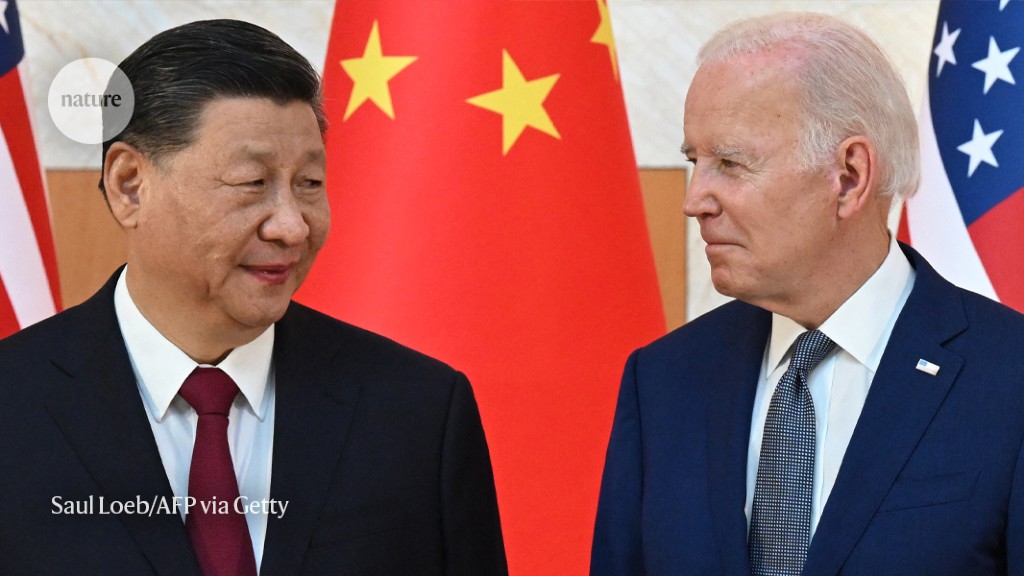by Natasha Gilbert & Gemma Conroy
The US government has extended for six months a key symbolic agreement to cooperate with China in science and technology. The agreement was due to expire on 27 August, and its short-term extension has revived researchers’ hopes that the 44-year-old pact will continue.
The pact does not provide research funding. Rather, it is an umbrella agreement to encourage collaboration and goodwill between US and Chinese government agencies, universities and institutions doing research in agriculture, energy, health, the environment and other fields. The extension means that, for now, research will continue as normal.
The non-binding agreement was first signed in 1979 and has since been renewed every five years. The new extension stops short of a full renewal, which some scientists worry is now in jeopardy. Without the agreement, research cooperation and programmes between the two governments could flounder, some specialists warn.
The extension “is not as good as a renewal”, says Denis Simon, a researcher in global business and technology at the University of North Carolina at Chapel Hill. “But it’s a good start. It says the US wants to stay connected.”
Growing tensions
The agreement not only has a practical role in promoting scientific collaboration, but also holds great symbolic value, say researchers in China and the United States.
“Abandoning such a long-standing agreement would exacerbate the ongoing decoupling in science and education” between the two nations, says Li Tang, a public-policy researcher at Fudan University in Shanghai, China.
When the agreement was last renewed, in 2018, it was amended to strengthen rights over intellectual property generated by research collaborations between the countries. But since then, tensions have grown, potentially contributing to the decision by the administration of US president Joe Biden to adopt only a short-term extension, researchers say.
Among the programmes that have degraded the US–China relationship is a US initiative that aimed to safeguard US laboratories and businesses from espionage. It targeted researchers of Chinese descent before it was shuttered last year. And last July, the US Congress passed the CHIPS and Science Act, which includes measures designed to tighten research security, such as requiring US institutions to report gifts of US$50,000 or more from a foreign government; the previous reporting limit was $250,000.
Meanwhile, the Chinese government recently restricted the flow of academic and health data from China, citing cybersecurity and data-privacy concerns.
In a statement to Nature, a US State Department spokesperson said that the country intends to negotiate amendments to the deal and that challenges posed by China’s science and technology strategies, protection of intellectual property and threat to US security are central considerations.
“This short-term, six-month extension will keep the agreement in force while we seek authority to undertake negotiations to amend and strengthen the terms of the [agreement]. It does not commit the US to a longer-term extension.”
Opposition in Congress
Some US lawmakers say the agreement poses a threat to national security and have called for scrapping it. In a 27 June letter to Antony Blinken, the US secretary of state, some members of a US House of Representatives committee on China alleged that research partnerships between government agencies in the United States and China organized under the agreement could have developed technologies that would later be used against the United States.
But some scientists have campaigned for the US government to continue the agreement. In a letter sent to Biden on 24 August, physicists Steven Kivelson and Peter Michelson at Stanford University in California wrote that the agreement provides an important framework for cooperation between the two countries and that cutting off ties with China “would directly and negatively impact” their own research. More than 1,000 academics signed the letter.
Kivelson, a theoretical physicist researching quantum materials, told Nature that many of his best graduate students and postdocs come from China.
“Much of the physics that I think about is based on experimental work that is done in China,” he says. “The entire field is highly dependent on and benefits from cooperation with colleagues in China.”
Collaboration under threat?
Deborah Seligsohn, a specialist in US–China relations at Villanova University in Pennsylvania and a former US State Department official who served at the US embassy in Beijing, says scientific cooperation between the two governments could become “deeply problematic” without the agreement. It provided a “critical structural basis” for projects such as one on birth abnormalities that was the basis for the discovery that folic acid can prevent spina bifida, a birth defect in which an area of the spinal column doesn’t form properly, and other neural-tube defects, she says.
Jenny Lee, a higher-education researcher and vice-president for international affairs at the University of Arizona, Tucson, says that, if the agreement is scrapped, it could hurt research and higher education in the United States more than in China. This year, China overtook the United States as the nation publishing the largest number of high-quality research articles. The impact will probably be felt in future when new collaborations fail to form, she says. “It will signal to the next generation of scientists that we don’t want to actively cooperate with China,” she says.
It’s not clear what amendments the US government will seek, but Simon says he is “cautiously optimistic” that the two nations can agree on a way forward that will lay the groundwork for future collaboration.
doi: https://doi.org/10.1038/d41586-023-02701-7
It’s not clear what amendments the US government will seek
They'll probably put in some kind of obvious poison pill then have a media propganda blitz to make it seem reasonable and then China will have to not renew it, and the media and politicians will blame it on China.
Yeah, that was my thought as well. They'd probably want China to ultimately refuse to renew it so the US can pretend to look "reasonable."
Honestly this is one of the things the US dies that makes me mad. A lot of US citizens have this fear of China, they see China as a WW3 adversary or something. And that's a direct result of the US spreading Chinese hate because they can't fathom that there is a different form of government other than republican capitalism.
We should just forget the stupid posturing and just work with China more. What's wrong with that? The US needs to stop being so aggressive with China, and do more stuff like this, in good faith.
Stop trying to push capitalism on people who clearly don't want it, just accept that it's a horrible system, and give me my utopian futuristic, space traveling, world government, fully automated society already lol.
The funny thing is, modern Chinese policy is against war.
Even from way back in 1964, the CIA determined that Chinese military doctrine is primarily defensive in nature [https://www.google.com/url?sa=t&source=web&rct=j&opi=89978449&url=https://www.cia.gov/readingroom/docs/DOC_0000413519.pdf&ved=2ahUKEwj36czJsIqBAxWgFjQIHSYqAIYQFnoECBQQBg&usg=AOvVaw1QQgwJTRyYQ6hXxNnSCqQP].
This recent study summarizes modern Chinese military doctrine https://www.google.com/url?sa=t&source=web&rct=j&opi=89978449&url=https://setav.org/en/assets/uploads/2020/02/A56En.pdf&ved=2ahUKEwj36czJsIqBAxWgFjQIHSYqAIYQFnoECB4QAQ&usg=AOvVaw1LSvgCeq0-dwzfela757iE
It's a defensive doctrine designed to protect local interests. Chinese foreign policy involves remaining in a justifiable grey zone, not in open conflict.
Even if you didn't know this, it should be obvious. How many "preserving democracy" wars has the US engaged in post WW2? Too many. War is for profit in capitalist countries.
This extension falls short of a full renewal, reflecting worsened attitudes towards China within the US govt
Pretty sure America will somehow weaponize this
Just look at COVID, IP stealing propaganda, banning China from the ISS when it's convenient for them, IP gating agriculture technology that would help the world and China alleviate hunger etc.







